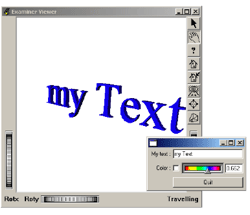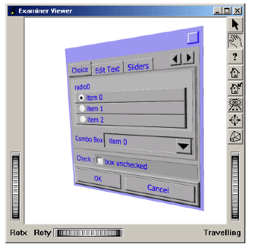Example 29.1. Tutorial01.cxx

This example of DialogViz shows you how to build a simple dialog window and make it interact with your application.
The string you write in the SoDialogEditText( C++ ) component is directly connected to the SoText3( C++ | Java | .NET ) in the viewer. The slider allows the text color to be changed using a DialogViz auditor.
This tutorial is located in $OIVHOME/src/DialogViz/examples/2D/samples.
C++
#include ... // Define auditor for dialog and viewer interaction class ButtonAuditor : public SoDialogPushButtonAuditor { public: void dialogPushButton(SoDialogPushButton *pb) { exit(1); } }; class SliderAuditor : public SoDialogRealSliderAuditor { public: void dialogRealSlider(SoDialogRealSlider *rs) { const float value[][3] = {rs->value.getValue(), 1, 1}; myColor->rgb.setHSVValues(0, 1, value); } }; int main(int, char **argv) { // Initialize Inventor and DialogViz Widget myWindow = SoXt::init(argv[0]); SoDialogViz::init(); // build the viewer scene graph SoSeparator *root = new SoSeparator; root->ref(); myColor = new SoBaseColor; myColor->rgb.setValue(1,0,0); root->addChild(myColor); myText = new SoText3; root->addChild(myText); myViewer = new SoXtExaminerViewer(myWindow); // Build the dialog scene graph SoTopLevelDialog *myDialog = new SoTopLevelDialog; SoDialogEditText *myEdit = new SoDialogEditText; myEdit->label = "My text : "; myEdit->editText = "my Text"; myText->string.connectFrom(&myEdit->editText); myDialog->addChild(myEdit); SoDialogRealSlider *mySlider = new SoDialogRealSlider; mySlider->label = "Color : "; const SbColor color[8] = { SbColor(1,0,0), SbColor(1,1,0), SbColor(1,1,0), SbColor(0,1,0), SbColor(0,1,1), SbColor(0,0,1), SbColor(1,0,1), SbColor(1,0,0) }; mySlider->colors.setValues(0,8, color); mySlider->addAuditor(new SliderAuditor()); myDialog->addChild(mySlider); SoDialogPushButton *myButton = new SoDialogPushButton; myButton->buttonLabel = "Quit"; myButton->addAuditor(new ButtonAuditor()); myDialog->addChild(myButton); // Show all myDialog->buildDialog(myWindow, FALSE); myDialog->show(); myViewer->setSceneGraph(root); myViewer->show(); SoXt::show(myWindow); SoXt::mainLoop(); return 0; }
Example 29.2. Simple 3D menu

This example shows how to build a simple DialogViz interface and load it as ordinary Inventor nodes in a viewer. The dialog box is loaded from an Inventor file.
This tutorial is located in $OIVHOME/src/DialogViz/examples/3D/simple3DMenu.
Here is the Inventor File:
#Inventor V2.1 ascii
TopLevelDialog
{
TabDialog
{
RowDialog
{
label "Choice"
DialogRadioButtons
{
label "radio0"
items ["item 0",
"item 1", "item 2"]
}
DialogComboBox
{
label "Combo Box"
items ["item 0", "item 1"]
}
}
DialogEditText
{
label "Edit Text"
editText "What a cool demo !"
}
RowDialog
{
label "Sliders"
DialogIntegerSlider
{
label "Integer :"
max 10
}
DialogSeparator {}
DialogRealSlider
{
label "Real :"
value 0.5
}
}
}
DialogCheckBox
{
label "Check :"
onString "box checked"
offString "box unchecked"
}
ColumnDialog
{
edgeStyle SHADOW_OUT
DialogPushButton
{
buttonLabel "OK"
}
DialogPushButton
{
buttonLabel "Cancel"
}
}
}
Here is the program source code:
C++
#include ... int main(int, char **argv) { // Initialize Inventor and DialogViz. Widget myWindow = SoXt::init(argv[0]); SoDialogViz::init(); SoSeparator* root = new SoSeparator(); root->ref(); SoDialogViz::setSkinsDirectory("texture"); SoTopLevelDialog* myDialog = (SoTopLevelDialog*) SoDialogViz::loadFromFile("./simple3DMenu.iv"); root->addChild(myDialog); SoXtExaminerViewer* myViewer = new SoXtExaminerViewer(myWindow); myViewer->setBackgroundColor(SbColor(1,1,1)); myViewer->setSceneGraph(root); myViewer->viewAll(); // then show. myViewer->show(); SoXt::show(myWindow); SoXt::mainLoop(); SoXt::finish(); // finish Inventor return 0; }